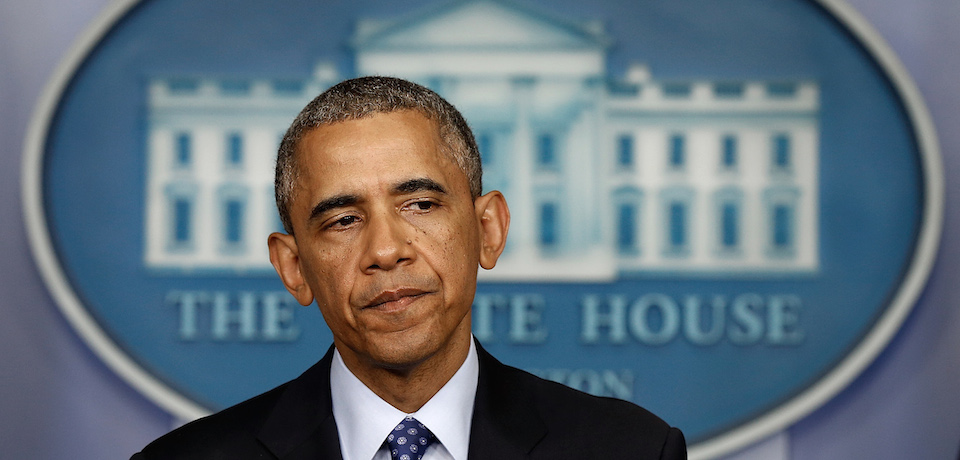Confessions of Barack Obama, Confidence Man

Tags: USA
Confessions of Barack Obama, Confidence Man published by Evanvinh
Writer Rating: 5.0000
Posted on 2016-03-12
Writer Description: Evanvinh
This writer has written 733 articles.
Barack Obama has been likened on more than one occasion to Mr. Spock, the famously cold, logical Star Trek character. And in a wide-ranging, unintentionally devastating assessment of the “Obama Doctrine” for the Atlantic, Jeffrey Goldberg uses the analogy more than once. But Obama is no Spock. Spock is logical; Obama is not. Spock is moved by tragedy; Obama is coldly indifferent.
The Obama that emerges from the Atlantic interview is preternaturally icy, contemptuous of both his adversaries and his own staff, thin-skinned, angry, and oddly self-satisfied. That character portrait aside, it would have been nice if the article had shed light on the worldview that governs Obama’s decisions. Rather, it illuminated the fact that he doesn’t have a worldview. Instead, the president of the United States has opinions, and lots of them. And people he really doesn’t like, and lots of them. And countries he thinks don’t count, like those that make up the Sunni Middle East.
The commander of the world’s most powerful military reveals that he is skeptical that military power is a solution to what ails the world. Obama, in Goldberg’s words, “believes that Churchillian rhetoric and, more to the point, Churchillian habits of thought, helped bring his predecessor, George W. Bush, to ruinous war in Iraq.” Obama clearly fancies himself as an anti-Winston Churchill or, alternatively, a more successful Neville Chamberlain, a calm, dispassionate peacemaker. And seven years into his presidency, Obama clearly also still defines himself as the anti-George W. Bush. One thread that emerges in this portrait of the president is that seven years in, when confronted with a challenge, he still silently asks himself, “What would Bush do?” — and then does the opposite.
He has thought long and hard about being the un-Bush and realizes that he strayed from that mantra twice: Once in aiding in the ouster of Libyan dictator Muammar al-Qaddafi, and once in threatening military action against Syria’s Bashar al-Assad for his use of chemical weapons. In the first case, the president clearly blames both Hillary Clinton and America’s much-disdained allies in Europe: “[The intervention in Libya] didn’t work,” Obama complains. “When I go back and I ask myself what went wrong, there’s room for criticism, because I had more faith in the Europeans, given Libya’s proximity, being invested in the follow-up.”
Yeah, those guys suck. But more on our worthless allies later.
On Syria, Obama has constructed an elaborate scaffolding around his ignominious retreat, both from his demands that Assad must go to his infamous “red line.” First, or so apparently went the president’s thinking, “[h]e was tired of watching Washington unthinkingly drift toward war in Muslim countries. Four years earlier, the president believed, the Pentagon had ‘jammed’ him on a troop surge for Afghanistan. Now, on Syria, he was beginning to feel jammed again.” (Never mind that later in the piece he dishes out another serving of self-satisfied praise for his decision to up troop levels in Afghanistan.)
Also, when it came to enforcing the Syria red line, he was worried about U.N. inspectors on the ground. And he was ticked that British Prime Minister David Cameron had failed to rally his Parliament behind military action. Finally, he couldn’t be sure of total success. And then there’s this gem: “This falls in the category of something that I had been brooding on for some time.… I had come into office with the strong belief that the scope of executive power in national-security issues is very broad, but not limitless.”
Now, there isn’t a man or woman in Washington that hasn’t engaged in a little ex post facto justification of a bad or cowardly decision. But most don’t try to elevate their fecklessness into constitutional doctrine. Because what Obama is saying is that suddenly, he cared about Congress. This from a man who unilaterally made deals with Iran and Cuba and who has governed almost exclusively by executive order and regulatory power, rather than through the legislature. Better still, Obama professes himself “very proud of this moment.”
Goldberg identifies this “moment” of cowardice as, in Obama’s mind, his “liberation day, the day he defied not only the foreign-policy establishment and its cruise-missile playbook, but also the demands of America’s frustrating, high-maintenance allies in the Middle East—countries, he complains privately to friends and advisers, that seek to exploit American ‘muscle’ for their own narrow and sectarian ends.”
Is this a weltanschauung or just the shallow pique of an irritable man? Nowhere do we see a sense of compassion for the people of Syria, a recognition of the growing menace of the Islamic State and al Qaeda to the safety and security of the American people. Rather, the president is delighted to have resisted being “jammed” by his own team and exploited by desperate Middle Eastern allies who apparently wish to oust Assad for all the wrong reasons. Which brings us to America’s allies.
Barack Obama doesn’t much like his nation’s traditional allies. Europe gets the back of his hand. Saudi Arabia is dealt the same. He (or one of his inner circle) retells the tale of him confronting Jordanian King Abdullah for bad mouthing the president. And then there’s Benjamin Netanyahu, for whom Obama reserves special contempt. The Bibi anecdote Obama chooses to share with Goldberg is unintentionally revealing, a story about interrupting the Israeli prime minister to explain that he knows perfectly well what the dynamics of the Middle East are. Well, OK. But does every discussion with Obama need to end with “I’m the president of the United States”? Apparently, yes.
In Obama’s construct, America’s allies are “free riders” on U.S. power and treasure. Nowhere does he profess an understanding of leadership or of what the concept of leading an alliance might mean. Indeed, at one moment, he refers to presidential leadership as “theater in political communications.” But this great man is too great for that sort of self-indulgent theater. He has a higher vantage point from which, with Goldberg’s assistance, he prefers to school the rest of us rubes.
Here’s how it really is: Is Vladimir Putin succeeding? Well, opines Obama, the Russian president is “not completely stupid.” According to him, Putin “understands that Russia’s overall position in the world is significantly diminished. And the fact that he invades Crimea or is trying to prop up Assad doesn’t suddenly make him a player. You don’t see him in any of these meetings out here helping to shape the agenda. For that matter, there’s not a [G-20] meeting where the Russians set the agenda around any of the issues that are important.”
Since when was the ability to manage the agenda of the G-20 (go ahead, try and name its members) a litmus test of strength? Yet here we see another almost incredible disconnect between reality and Obama-world. Russia, which is indeed setting the agenda in the Middle East and in Eastern Europe, is doing so without breaking a sweat because Obama has chosen not to push back. Why not? Because apparently pushing back requires war with Russia, rather than the myriad other options available to America’s chief executive, including arming Ukrainian soldiers or inflicting more financial pain on Moscow. Straw men play an enormous role in the president’s universe.
The manifest reality we learn is that Obama isn’t really interested in Russia or the Middle East. What really lights him up is the pivot to Asia — an aptly named policy given the president’s clear intention to turn his back on the rest of the world. But even there, where we see a slightly human, modestly optimistic leader, Obama’s vision is at once disconnected from reality and myopic. Is he focused on China, one of the reasons so many of its neighbors have come flocking to Washington for reassurance? Not really. Rather, he tips his hat to — wait for it — Malaysia, which, thanks to his keen stewardship, might join the anti-Islamic State coalition. Indeed, for all his self-congratulation about Asia, he is leaving his successor with three stark facts: Malaysia and Indonesia once again face a jihadi threat thanks to Obama’s decision to allow the Islamic State to fester; China now holds more maritime territory in the South China Sea; and North Korea has more nukes and is perfecting the means to deliver them.
But the Malaysia story is of a piece with every part of Goldberg’s deep look into what drives Obama, the man. The president confuses the reality of the world with his own prejudices about it: Venezuelan leader Hugo Chávez wasn’t worth his attention because he was all talk. Saudi Arabia is only trying to use U.S. power to win its petty war with Iran. Tribalism is what drives the modern Middle East, and we shouldn’t get into that fight. Think tanks in Washington aren’t driven by ideas, but by Jewish and Muslim money. Russia doesn’t matter. Climate change is huge. Getting Malaysia on board in the fight against the Islamic State is key. And then there’s the United States: America is a nation with bad instincts, whose hubris should be “regulated” and propensity to manage the challenges of the world constrained by outside forces. (Other than the weather, which he believes Americans ought to be able to manage.)
So what of Crimea and the explosion of the Islamic State and al Qaeda across the Middle East, North Africa, and South Asia? What of the nearly half-million Syrian lives lost or that country’s 4 million refugees? What of Iran’s sequential violations of its missile deals with the West? Of China’s growing menace in the South China Sea? What of the exploitation of the youth Obama professes to care for in Cuba and Venezuela? What of America’s stand as a beacon of democratic capitalism, of humane leadership, and compassion?
To paraphrase our fearless leader, that’s all stupid shit.
Sources: No sources found for this article.
You have the right to stay anonymous in your comments, share at your own discretion.


